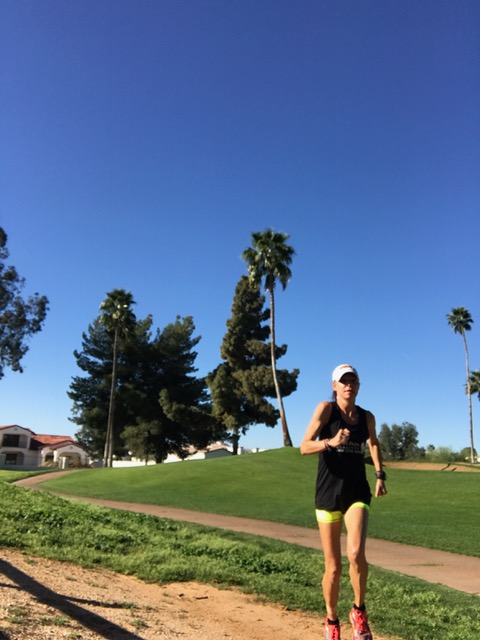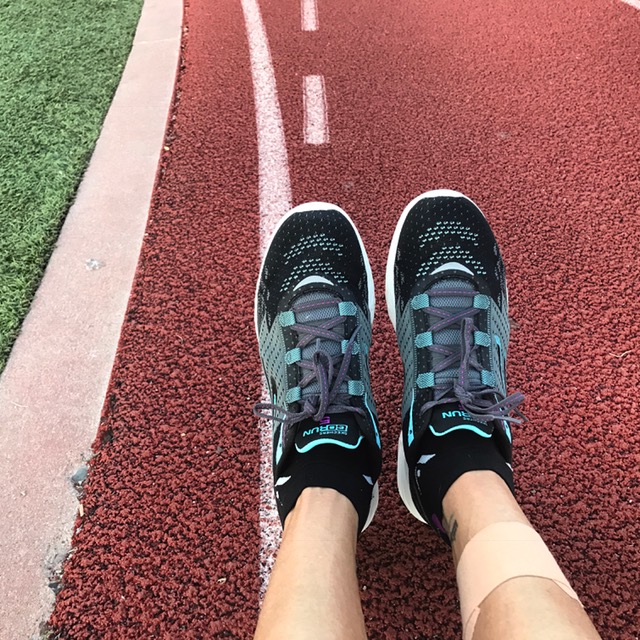Most of us can come up with plenty of reasons to avoid speed work: we might say it hurts; it increases our chances of picking up an injury; it makes us too tired for our other runs… the list is endless. The thing is, they’re all unnecessary fears. What’s more, whether you want to beat an ancient 800m PB set on the grass track at school, or outkick the runner who always sprints past you in local 10Ks, to get a PR in your marathon or finish your next 100 miler stronger, adding speed will be immensely rewarding.
Speed work doesn’t just make you run faster. It makes you fitter, increases the range of movement in your joints, makes you more comfortable at all speeds, and it will ultimately help you to run harder for longer.
I love speed work. As a former sprinter this is really my strength; however, after been semi-injured with achilles tendinitis coming back to the track has been harder than I thought. Not physically, mentally. That’s why I decided to write about this topic. Also, I don’t talk much about my training but last year when I was in full marathon training mode I was focusing more on doing long tempo runs where I had to hold a certain pace. Not a super fast pace, just the kind of pace that makes you uncomfortable but (hopefully) you can hold for a long time (like in a marathon!). This has been my weakness both physically and mentally so the training for it was necessary.
Starting this new year (2017) Kevin told me we should focus the first part of the year into building speed and doing shorter distances so I could run a faster marathon in the Fall. Yes, if you want to run a faster marathon (or even an ultramarathon) you can benefit tons from speed training.
If you’ve already added a speed session or two to your schedule then you’ll know all of this already. If you haven’t, then here are a few things to remember.
1) Ease into it: When you started running, you ran for just a couple of miles every other day, and have gradually built up to your current mileage. You didn’t suddenly start running 35 miles a week, so adopt the same approach to speed work. Put at least three months of steady running behind you, then start with just one session every 10 days or so.
2) Not too hard: Speed sessions aren’t about sprinting flat out until you’re sick. They’re about controlling hard efforts and spreading your energy evenly over a set distance or time, just like you would in a perfect race.
3) Warm up and warm down: Before each session, jog for at least 8-10 minutes to raise your blood temperature, increase blood flow to the muscles and psyche yourself up for fast running. Follow that with some gentle stretching and then run a few fast strides before getting down to the tough stuff. Afterwards, jog for another 5-10 minutes, before stretching once again.
4) Pacing yourself: When you start speed work you might find pacing yourself difficult. If you’ve run a 5K race and a session calls for that pace, then you’ll have an idea of what it feels like. But if you haven’t raced the distance indicated for the session, don’t worry, because you’re most likely to find the right pace through trial and error anyway.
While the idea of speed work is obviously to run quickly, you’ll rarely be running flat out. Instead, the time for each rep should be pretty similar, unless indicated otherwise. Run too hard at the start of a session and your times will fall off; take it too easy to begin with and you will speed up, but the session won’t benefit you as much as it should.
In fact, for your first sessions it’s better to be cautious, because you don’t want to immediately hate speed work, and you’ll know that next time you can push yourself harder
TYPES OF SPEED WORK:

Repetitions/intervals
Periods of hard running at 5K pace or faster, between 200m and 1200m in length, or 30 seconds and five minutes. Recovery periods can be short (30-90 seconds), or of an equal time or distance to the reps. Running at harder than race pace for short periods not only improves speed, but also allows you to work on your running form. When you’re pushing hard, it’s important to concentrate on things like arm and hand motion, posture and stride length. If you can keep these together during a hard session of reps, it will be easier to do so during a race. Don’t attempt reps until you’ve tried other types of speed work for a couple of months.
Tempo intervals
These are longer than ordinary intervals in that they take between 90 seconds and 20 minutes (or between 400m and three miles) and are run a little slower than your 5K pace. These work a bit like threshold runs – they raise the point at which lactic acid builds up in the muscles. Tempo runs are also repetitions of longer distances (one mile repeats, sets of 2 miles together, holding up to six miles at a certain pace during your long runs, etc). The importance of tempo intervals is that they set your body into the pace you would ideally hold in your marathon or in periods of your ultra race under ideal conditions.
Fartlek
Fartlek is Swedish for ‘speed play’ and is the fun side of speed work. Best done on grass or trails, you simply mix surges of hard running with periods of easy running. Run fast bursts between phone boxes, lampposts or trees when you feel like it, and as hard you like. Great for newcomers to speed work (I strongly recommend adding one session like this per week. I generally go 2 miles easy and then the first minute of each mile really fast and the rest of the mile at a moderate pace)
Hills
Simple: find a hill that takes between 30 seconds and five minutes to climb at 85-90 percent effort, and run up it. Jog back down to recover. A great alternative to track intervals (I love doing this once a week in addition to my track day)
I hope this was helpful to you all. Remember, the most important thing is to ALWAYS listening to your body. As the great Men said “it’s better to get to the start line slightly undertrained that not to get there at all”.
Thanks for reading! Remember you can suscribe to this blog and remember to follow me on instagram (insightfulrunner), twitter (terezacher) and Facebook (Tere Zacher page) for daily motivation

Muy bueno Gracias
Sent from my iPhone
LikeLike